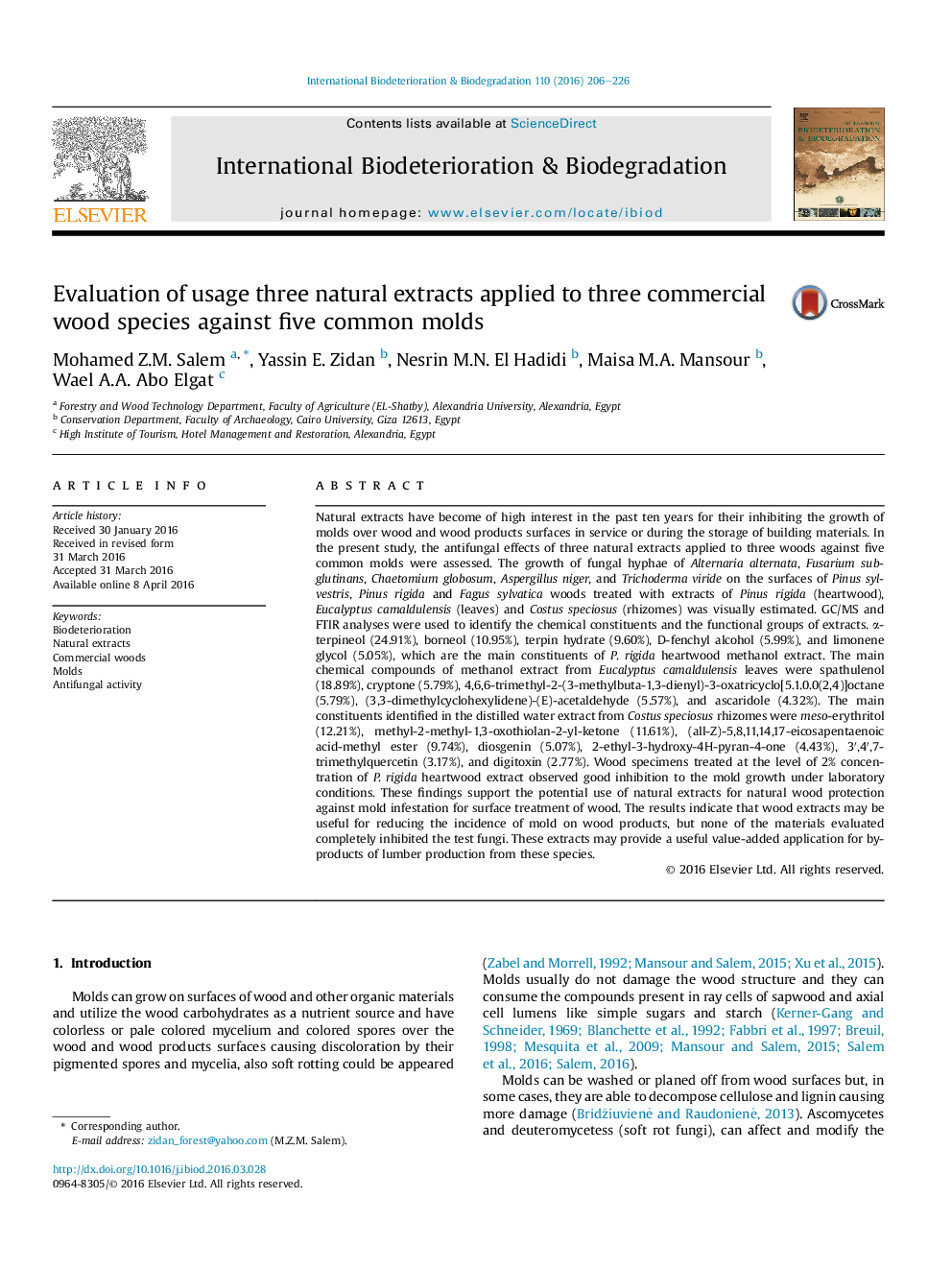| کد مقاله | کد نشریه | سال انتشار | مقاله انگلیسی | نسخه تمام متن |
|---|---|---|---|---|
| 4364215 | 1616307 | 2016 | 21 صفحه PDF | دانلود رایگان |
• We applied three natural extracts to Pinus sylvestris, Pinus rigida and Fagus sylvatica woods by immersion method.
• We used molds Alternaria alternata, Fusarium subglutinans, Chaetomium globosum, Aspergillus niger, and Trichoderma viride.
• We used extracts of P. rigida (heartwood), Eucalyptus camaldulensis (leaves) and Costus speciosus (rhizomes).
• Methanol extract of P. rigida heartwood provided significant inhibition to mold growth on the wood surfaces.
Natural extracts have become of high interest in the past ten years for their inhibiting the growth of molds over wood and wood products surfaces in service or during the storage of building materials. In the present study, the antifungal effects of three natural extracts applied to three woods against five common molds were assessed. The growth of fungal hyphae of Alternaria alternata, Fusarium subglutinans, Chaetomium globosum, Aspergillus niger, and Trichoderma viride on the surfaces of Pinus sylvestris, Pinus rigida and Fagus sylvatica woods treated with extracts of Pinus rigida (heartwood), Eucalyptus camaldulensis (leaves) and Costus speciosus (rhizomes) was visually estimated. GC/MS and FTIR analyses were used to identify the chemical constituents and the functional groups of extracts. α-terpineol (24.91%), borneol (10.95%), terpin hydrate (9.60%), D-fenchyl alcohol (5.99%), and limonene glycol (5.05%), which are the main constituents of P. rigida heartwood methanol extract. The main chemical compounds of methanol extract from Eucalyptus camaldulensis leaves were spathulenol (18.89%), cryptone (5.79%), 4,6,6-trimethyl-2-(3-methylbuta-1,3-dienyl)-3-oxatricyclo[5.1.0.0(2,4)]octane (5.79%), (3,3-dimethylcyclohexylidene)-(E)-acetaldehyde (5.57%), and ascaridole (4.32%). The main constituents identified in the distilled water extract from Costus speciosus rhizomes were meso-erythritol (12.21%), methyl-2-methyl-1,3-oxothiolan-2-yl-ketone (11.61%), (all-Z)-5,8,11,14,17-eicosapentaenoic acid-methyl ester (9.74%), diosgenin (5.07%), 2-ethyl-3-hydroxy-4H-pyran-4-one (4.43%), 3′,4′,7-trimethylquercetin (3.17%), and digitoxin (2.77%). Wood specimens treated at the level of 2% concentration of P. rigida heartwood extract observed good inhibition to the mold growth under laboratory conditions. These findings support the potential use of natural extracts for natural wood protection against mold infestation for surface treatment of wood. The results indicate that wood extracts may be useful for reducing the incidence of mold on wood products, but none of the materials evaluated completely inhibited the test fungi. These extracts may provide a useful value-added application for by-products of lumber production from these species.
Journal: International Biodeterioration & Biodegradation - Volume 110, May 2016, Pages 206–226
